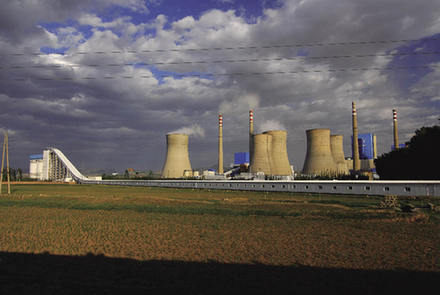|
Many localities have formulated economic development plans incorporating environmental protection, and the Shanxi provincial government ruling: "Any government official found to be polluting environment forfeits promotion," discourages commercial activity detrimental to the environment. "In 2007 our county invested RMB 20 million in counteracting environmental problems," Sun Guangtang said. A local farmer confirmed, "Upgraded chemical plant facilities have reduced river pollution."
In 2007, Shanxi Province built two pollutant discharge elimination systems to protect the Fenhe and the Qinhe rivers flowing through the province. It has also constructed 46 nature reserves covering a total of 1.13 million hectares, an area equal to around 7.26 percent of land in the province.
Ju Qiongying is secretary of the Zuoquan County Committee of the Chinese Communist Youth League, and founder of the Zuoquan County Association of Environmental Protection. Her environmental activities over the past three years have won support from both the local government and people from all walks of life. At present, the organization has 33 institutional and 1,000 or more individual members.
Ju Qiongying raised RMB 600,000 from various communities in 2006 to found the Taihang Mountains Black Stork Nature Reserve, where she built a bird-viewing terrace and cistern, in neighboring Zhaojiazhuang Village. More than 10 black storks (national category-I protected birds) and 260 herons (national category-II protected birds) now inhabit the reserve.
Woods on nearby mountains are traditionally the sources of timber for mountain villagers, and Ju Qiongying makes regular visits to villages on the mountain to explain to inhabitants why they should not cut down trees or run small smelting factories.
In the past three years, Zuoquan County has invested a total RMB 170 million in energy-saving and pollution reduction, closing down in the process more than 350 medium-sized and small polluting enterprises and facilities. The county has reduced wastewater discharge by 1.2 million tons and sulphur dioxide emissions by 4,236 tons since its sewage treatment plant went into operation. The goal of de-polluting the Qingzhang River has thus basically been achieved.
Taking the initiative to adopt environmental protection measures is a weighty decision for China's enterprises: it entails high investment and brings few short-term gains. But even grassroots enterprises realize that energy-saving and environmental protection is not necessarily a losing deal. The Zuoquan county government offers financial support, in the forms of land leases, contracts and shareholdings, to encourage enterprise investment in forestation. Coal mine owner Pei Naijiang built the Huading Ecological Plantation, where he grows chestnut trees and an ecological forest, on 1,100 hectares of contracted land. Zhao Baoming, former deputy general manager of Xinxing Smelting Company, purchased the land-use rights to 440 hectares of wasteland where 8,000 chestnut and 60,000 other species of trees now stand, including oriental arborvitae, Chinese pine, locust, mountain peach, and mountain apricot. There are 26 similar plantations in the county totaling 5,000 hectares.
The Quandary of Change
|

|
| The coal dock of a power plant in Jiangsu Province. |
"To prosper, we must change the industrial structure by minimizing its dependence on natural resources," says Sun Guangtang. "Proliferating chemical and coal mining enterprises pollute the environment, and enterprises of this kind are vulnerable to fluctuations in the outside economy, which threatens the county's stable economic development."
| 